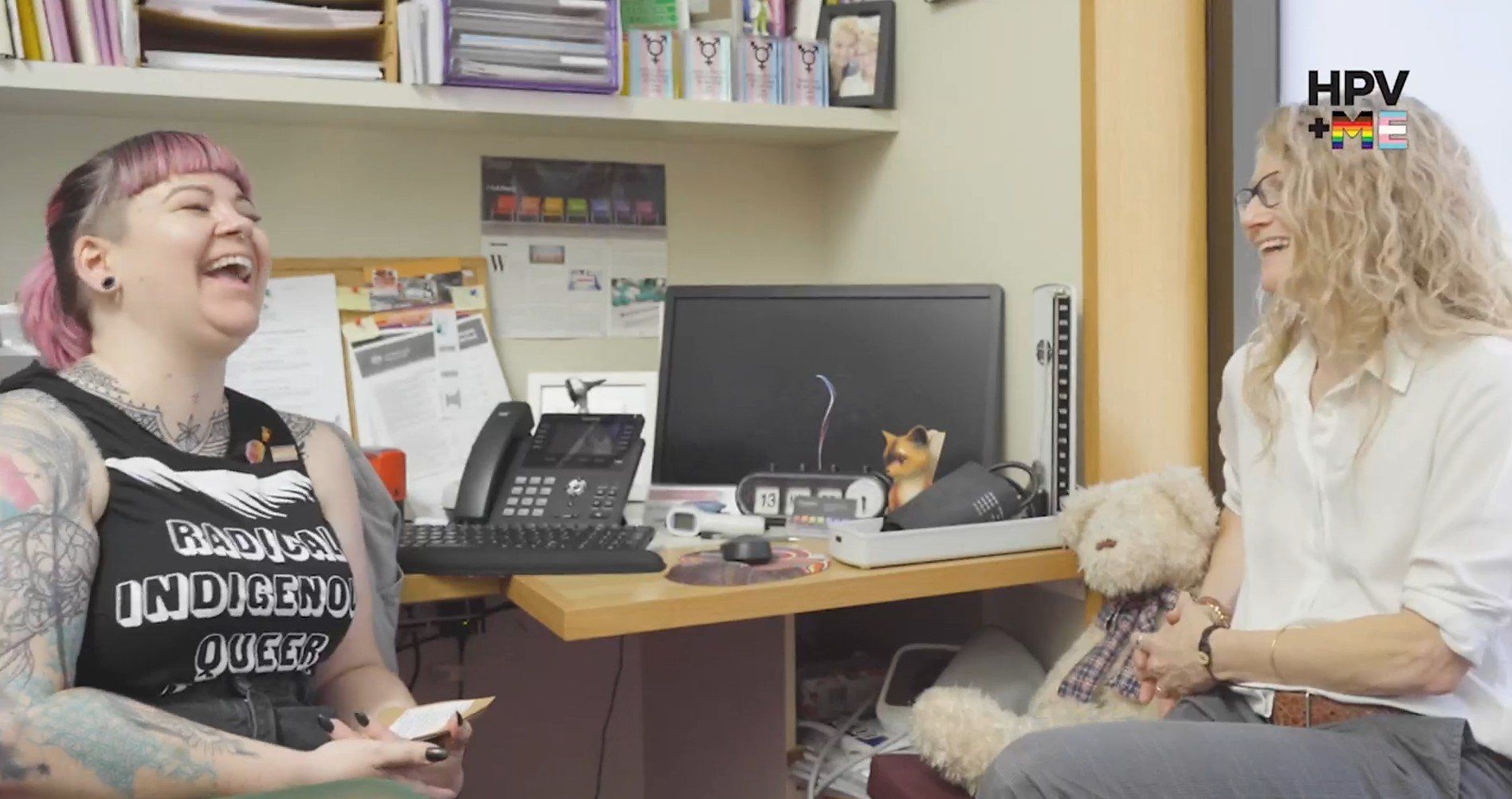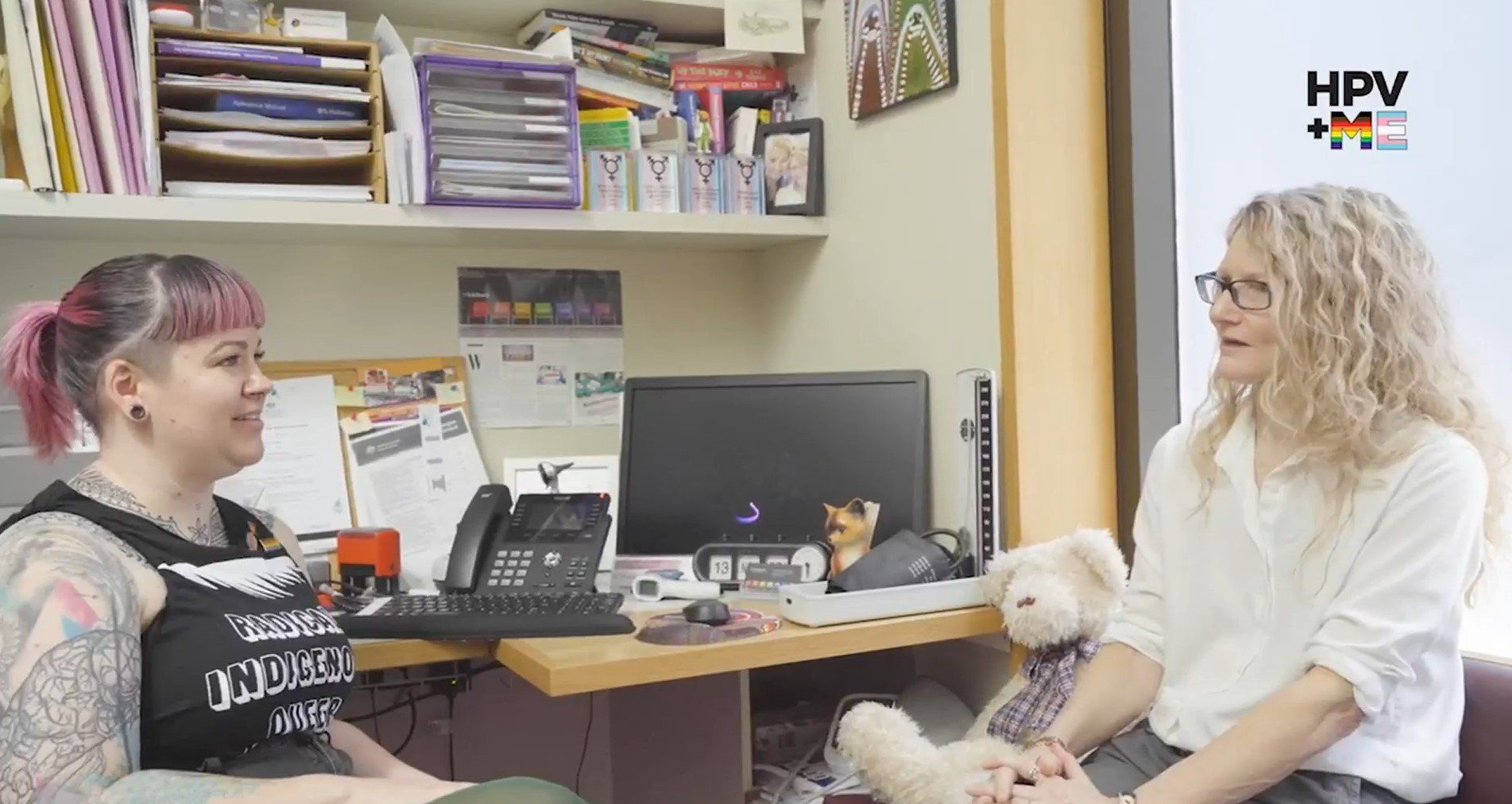Testing, screening and treating HPV
In this video for the community, Asha & Dr Bisshop discuss testing, screening and treating HPV for LGBTIQ+ people.
The video will cover the following topics:
- Trans men and HPV, and testing
- Cervical screening
- Organ inventory – what organs they have that need testing
- Barriers for accessing screening
- Impact of testosterone on cervical screening
- Making cervical screening more comfortable
- Impact of dysphoria on accessing screening
- What involved in cervical screening?
- What can you ask for during cervical screening?
- Sedation for cervical screening
- Neovagina and HPV screening
- Anal cancer screening – digital rectal examination
- HPV and gay men
- HIV+ and HPV related cancers
- HPV screening for people who have had hysterectomy
- Self-screening options
- Intersex people and HPV healthcare
Video Transcript
I'd love to chat through some of our lived experiences and what we need to be aware of is queer folk. What do trans men need to know about HPV and what testing options are available to them?
Basically, if they've got a cervix, they need to look after it. I use a thing called the organ inventory, so when I talk to patients about their bodies, I talk about what organs they've got, so we don't have to get into the nitty gritty of any kind of gendered language. But if you have a cervix and you've ever had any insertion or anything going on there, then you need to be having cervical screening. I guess being aware that there is a screening programme and that they as a trans man are not just eligible for it, but absolutely should be taking part in it. There are barriers to that happening. For instance, if you are not out to a doctor, they might not even know you're trans man. Being able to have an open relationship about who you are and what your health needs are with your healthcare provider is really important. Your doctor might not even realise that you are eligible for the screening program. Hopefully they do. But they also may not realise, what are some of the particular issues that you might have as a trans man when it comes to accessing a screening test for cancer of the cervix or for HPV. Specific issues relate to, for instance, having been on testosterone for a while. Testosterone can make some of the genital tissue a little bit more sensitive. It can cause dryness and discomfort and sometimes even bleeding down in that part of the body, which can make the whole process of having an HPV test somewhat uncomfortable. Nobody ever likes having a pap smear, it's a pretty common complaint. When people come into my room, if they have a certain look on their face I say, are you here for a cervical screening test? Because nobody wants to have it. I don't want to have it! It's not fun, but if you've been on testosterone, it's less fun because it can be more uncomfortable. Being aware of that and being aware of some things that you can do or that your doctor can offer you that will make the process more comfortable is important.
And I imagine that's a similar experience whether someone’s nonbinary, genderqueer or gender diverse, if you have a cervix, you still have that organ that requires care.
That's right. Even some women who have sex with women don't feel comfortable with sharing information about that part of their body or letting someone see that part of their body. And there can be so many reasons for that, including previous trauma, previous unpleasant experiences with doctors or hospitals. There's lots of barriers to being able to ask for that test or having it offered to you. And I think sometimes doctors make assumptions about people, which is unfortunate because we shouldn't be making any assumptions. And the other thing is that, especially for people who are trans or nonbinary or gender queer, is that they may have some significant dysphoria about that part of their body. So even talking about it, let alone going there for an examination can be really triggering and upsetting. Being able to have a conversation with your doctor preparing for it, I think understanding the importance of the test, ‘Why are you having it?’, paves the way to be able to do it. What's involved when you have this test? The main way we get a sample for HPV screening is we have to put a speculum inside the vaginal canal and that's the bit that nobody wants to have happen, right? Speculums are not really big. They come in different sizes, actually.
Yeah, I was going to ask, like, I'm aware of that. I know. And you can ask for a smaller size.
You can ask for a smaller size. It may not be appropriate because if it's not long enough, it won't get to where you want it to go. But you can start with a small one. It's called a duck-billed specular because it looks like a duck. If you're particularly uncomfortable about having it, you can ask the doctor if you can put it in yourself because that might feel a bit more comfortable. Doctors who are good at it, speculum insertion, will be able to do it so it won't be too uncomfortable. And we use lubricant and if it's a metal one we'd warm it up. I use plastic disposable ones because that's much nicer. We put that in and really once the speculum’s in and we can see the cervix, it's a matter of seconds to use a little brush to take a little sample and that's all that has to happen. But you know, people will work themselves up for something that literally takes 2 minutes and after it's over, so many people will be like, ‘God, that was not as bad as I thought it was going to be’. And I recognise that that is not the experience that a lot of people have had for a variety of reasons. They've had a doctor who wasn't particularly understanding or they've been really stressed and anxious, and so the whole process has been really difficult so I've totally recognised that for many people it that has not been the experience. That's the experience I tried to offer people, which hopefully is what most people will have when they go to have cervical screening done.
And it's good to know that there's those options exist. If you need to, you can ask for a different size, you can insert yourself. I think just knowing that you have some options and some agency in the process can help with anxiety sometimes.
Often doctors will ask if you'd like to have someone else present in the room, like a support person or a chaperone. Most male doctors would offer a chaperone for these kinds of intimate examinations. And you can absolutely, you're within your rights to ask to have someone there with you. Occasionally some people require some sort of medical sedation or something that relieves their anxiety a bit to be able to have this, and that's a perfectly legitimate use for some sort of Valium type product as well. And you can talk to your doctor about whether that's something that you might need beforehand. Yeah, just to feel more comfortable about it all.
There's not really a screening program that's designed for trans women who have got neovaginas. And part of the reason for that is that most women who have a neovagina don't actually have a cervix. Because they don't have a cervix, there's not that tissue to take the sample from. Occasionally some women do, because they've had one created out of what used to be the glands or tip of the penis. And for those women, a [cervical screening test] actually would actually be reasonable.
Whether you have a cervix or not, you could still maybe develop warts internally?
You could, and it depends what sort of tissue may have been used to create the neovagina, but it could be the sort of tissue that that HPV would happily set up camping so. A speculum examination or a digital examination will help to tell if there's a problem there. We don't have a good screening program for that. And the best that we can offer for anal cancer screening is for anyone who has ever had HPV or who has anal sex or has any kind of activity there to have, once a year, get their doctor to pop a finger in and do what we call a digital anorectal examination. It's a fairly crude sort of examination in that we're just feeling, we're feeling for lumps that shouldn't be there. We're looking for things that could indicate HPV infection has occurred and then we would investigate further. But if you don't put the finger in and check, then you won't know whether there's anything abnormal there. You don't necessarily get any symptoms from it. And I think I should also mention that men who have sex with men, if they are HIV positive, their risk of developing anal cancer is 100 times the general population. For those people who are HIV positive and that doesn't just go for men who have sex with men, but anyone, who is HIV positive, they have a much, much higher risk of HPV related cancers. They should be having check-ups. They should definitely be having the annual finger up the bum check. For those who have a cervix, they should be having more frequent HPV testing.
The question that has come up from the community is folks, whether it's, you know, queer, lesbian, bi women or trans men that have had hysterectomies and their cervix has been removed, the question came up about ‘do we still require screening’, which I have assumed the answer is no, because it requires the cervix to be swabbed, but it would be great to clarify?
Well, actually it depends. If someone’s had a previous HPV infection that led to an abnormality and that might be the reason why they've had a hysterectomy, then they still need to have screening. They have what we call vaginal vault screening where there's no cervix there anymore, but we're just screening the general area to look for abnormal cells in case there was anything left behind. For the majority of people who have had a hysterectomy for other reasons, they don't need to have cervical screening if there's no uterus and cervix there. Most people who have had hysterectomy will not have a cervix. It's pretty rare for them to leave the cervix behind, and I can't think of a good reason why you would. But if you feel really uncomfortable without having a speculum examination to have cervical screening, there are certain circumstances where you can actually do what's called a self-collected swab where the doctor gives you a swab, you take it and go to the bathroom, pop it in, twiddle it round, bring it back out, it goes in a special container and that's it. You do your own cervical screening. It's an HPV test that you do yourself. Unfortunately, it's not available to everybody at the moment. There's only availability for people who are in what we call an under screened group, which is people who are more than two years overdue for their screening and are at least 30 years of age. If you're over 30 yet and you haven't had, perhaps you're if you're two years overdue, then you can do self-collected swabs.
That's really good to know because the LGBTIQ+ community, lesbian, bi, queer women, trans men, nonbinary folk, anyone with a cervix, we are in that cohort that is less likely to access screening.
I was just listening to a talk the other day from America about the screening over there and they estimate that 50% of their LGBTQ community is under screened for cervical cancer or has even never had a screen.
Folk who may have an intersex variation. What do they need to be aware of when it comes to HPV in their healthcare?
Intersex people, that covers a wide variety of different kinds of body types and genitals and organs. It's certainly not a cohesive group. There's a lot of variation within the intersex community and the most important thing is that you're aware of what organs you've got and that your doctor understands that because that's how you figure out what screening you need. It's all about having a GP who understands what your anatomy is and can respectfully discuss what needs to be done to keep you healthy.





